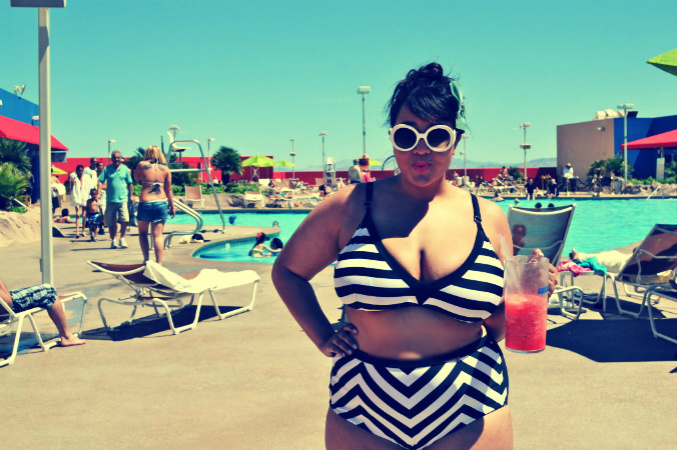
WHEN COLLEEN STOVALL SITS at her computer to write entries for her blog, shortcurvyfierce.com, she is literally taking the fashion world into her own hands. Many women have begun to dip into the blog world, penning their own ideas about fashion, beauty and the fashion industry. However, there exists another group of women, who like Stovall are short and curvy and fierce and black, that are taking a grass roots approach to disseminating ideas about the fashion industry. These women are well versed and well aware of how the fashion industry limits their participation in fashion: they are not thin, they are not tall, and they are not white. Instead of attempting to change their bodies to subscribe to these restrictions, these women simply celebrate and cultivate the bodies and skin in which they exist, usurping and transforming power to define and label themselves as fashionable, beautiful and worth taking seriously.
Stovall represents the myriad of roles that plus size black women may play in the fashion arena: she is a mother, wife, businesswoman, plus size model, plus size-advocate, and a bridge between fashion, fashion experts, and the everyday woman. She, along with Domonique Revere-Lincoln, Founder and CEO of Empress Lingerie, co-founded and co-produced the inaugural Curvy Closets Plus Size Fashion Showcase in Philadelphia, Pennsylvania in September 2012. At this show, the producers featured not only black, white and Latina plus size models of varied silhouettes, but also black plus size designers, black boutique owners and black businesswomen from the east coast of the United States. At Curvy Closets I saw first hand the planning, execution and networking in which plus size fashionistas participate in in order to build their brand of fashion. Like the catwalk the stage managers built from the ground up, these women utilised their plus size network connections to make Curvy Closets a reality. In attendance were powerhouse fashion experts of the plus size scene like Madeline Figueroa-Jones, editor of PLUS Model Magazine, Sharon Quinn, the ‘original runway diva’, and Gwen DeVoe, founder of Full Figured Fashion Week. There were models, bloggers, photographers and journalists all present to record this singular plus size event of Philadelphia’s 17 Days of Fashion. Overall, Curvy Closets was an immense success not simply because of the people present, but because of the community of women present at the show that were grateful to find fun, flirty, and sexy clothing that fit and flattered their bodies. Stovall and Revere-Lincoln, who are hard at work planning this year’s event, served as agents who carved out their own space in fashion that is large enough to fit the women in which they serve and powerful enough to reject and redefine the fashion industry’s ideas of beauty.
While black plus size fashionistas are working hard to shift attention from one stereotype of beauty to a wider range of possibilities, some inevitably disagree on what is exactly plus size, what is black, and ultimately, what it beautiful. Gabi Gregg, of GABIFRESH, is a stylish, well-connected and impeccably dressed businesswoman from Chicago that attempts to push the boundaries of fashion, beauty and body size. Gregg has been featured in PLUS Model Magazine, is a clothing ambassador for the Eloquii brand, and has worked for American Vogue as a fashion consultant. She asserts that her blog creates a space for plus size women who love fashion, but seem to be forgotten by the fashion world. Last year, her blog garnered national attention when Gregg featured herself photographed in a ‘fatkini’. She had done so in 2011, but this time she called for other women to submit photos of themselves in fatkinis for the ‘Fatkini Gallery’. The gallery received numerous responses, mainly laudatory, but some were highly critical of the women’s physiques and perceived physical health. However, what I found most compelling is that other plus size women commented that they did not consider Gregg’s waist-hip proportionate body to be plus size and that they felt her fair skin and wavy hair denoted the favouritism for phenotypes that resembled European features. Gregg appeared on the Today show to discuss the responses and openly admitted that she has stretch marks and cellulite, but she posed in her picture so that they were not readily visible. She also publicly acknowledged her participation in the body acceptance movement by urging women to love their bodies no matter the so-called standards set by the fashion and advertising industry. Gregg’s ability to speak through her blog, in highly accredited magazines, and on national television attests to the power of the plus size fashion world and the women who are both behind and in front of the camera who are pushing the boundaries of fashion all over the world. The amount of comments from plus and non-plus size women made national television networks take notice that plus size fashion is indeed a viable topic that deserves recognition.
However, several questions still remain: Does Gregg’s and other women’s proximity to European beauty affect her power as a plus size model? What happens when there is a rift between what is wholly acceptable as plus size? Will the plus size fashion world reinforce, reject or reconfigure the biases that the fashion world possesses for fat, dark skin women? These questions may not be completely answered at this moment, but will definitely be discussed and explored over time through the blogs of plus size black women who constantly push back on the borders of fashion. Women like Colleen Stovall and Gabi Gregg will continue to show us with the strokes of their keyboards that there is fashion power in short, big, fiercely brown bodies, and that they will use this power to set their own limitations in their own words.
Courtney Patterson is a PhD researcher in the Department of African American Studies Northwestern University.